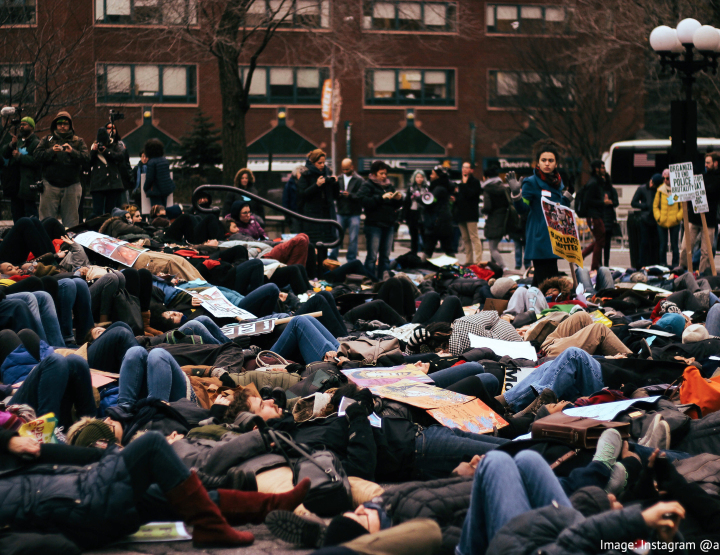At university, being a nice guy (at least according to my beautifully curated social media avatars/metrics) seemed like the perfect fit. I was the quintessential nice guy; academically my performance was perfectly adequate and I had a sizeable, thoroughly decent group of friends. Thus far, I have passed every exam, dotted every ‘i’ and crossed every ‘t’ on my CV, secured a job which I adore many aspects of and pays me just enough to keep me sensitive to my employers needs (the perfect hamster wheel). So why the dark cloud hanging over me?
Delve deeper and it becomes clear that I was and still am entrenched in the ‘nice guys finish last’ camp – actually, camp doesn’t seem the right word. My situation is more akin to the guys in the back of a marathon making up the numbers, some of us even run it in costumes ranging from the whimsical to the ludicrous, to detract away from the frankly abject sporting performance.
Sure, you complete the same course as the professionals and you come away with a medal but bottom line – you finished at the rear. Looking back, I grimace at all the missed opportunities, all the participation but never winners medals. As nauseatingly clichéd as it sounds, this was even more striking in my personal life, where I had a list of missed female opportunities longer than the average Oscar acceptance speech. The ‘nice guy’ label was neither good nor bad. It was however, an astonishingly accurate predictor of my actions. My internal PR machine meant I would always carry out the action that would maintain or enhance my persona as a nice guy, even if it was detrimental to my personal flourishing.
My situation/dilemma will resonate with many in the Mr. Nice guy community (yes we are a community, we may even possess a forum); often we thrive in situations where success does not impinge on our image as a ‘nice guy’, hence why we often do well academically or playing the role of best friend (reliable, trusty, dependable). Yet we tend to flounder if the only means of success requires us to be selfish by putting our needs first and running the risk of losing universal consensus as a ‘nice guy’
The ‘nice guy’ burden tends to be at it’s heaviest with regards to personal relationships and is becoming less of an anchor professionally. This is not to say that being the office nice guy can’t present with obstacles to long term success, mainly a misplaced loyalty to employers and co-workers that can render us unable to ask for a pay rise, promotion or simply leaving to seek greener pastures.
Looking around however, it now seems possible to uphold the principles of being a nice guy without hampering career progression. This is primarily due to the evolution of the office ecosystem.
A perfect example of this is investment banking; which was in the 80’s and early 90’s filled with testosterone fuelled, boorish men employing Machiavellian tactics to accumulate enough cash to fund multiple marriages and subsequent divorces.
Despite the furor about bankers in recent times, you look around and the vast majority are nice guys. This scenario is replicated in many sectors. To be a nice guy is no longer seen as a liability, in fact it is an asset, as companies such as Google and John Lewis have shown. The ability to form relationships, be dependable and to take an altruistic approach to work, are principles that generate profit. The age of the alpha male(s) is no longer considered a viable long-term business model.
Even in the media there is a shift towards nice guys – yes, though Kanye West, Robin Thicke and Justin Bieber receive column inches detailing their recent decline into lewd escapades, they are not as profitable as when they had cleaner images. Nice guys like Bradley Cooper, Ryan Gosling, and Pharrell Williams (responsible for the Mr. Nice Guy anthem), are thriving and proving to be extremely bankable. The public in general are less forgiving of petulance and a sense of entitlement, they value the ability to project a ‘nice guy’ facade, the best proof of this may be the resurgence of the Royal Family built on the pillars of Prince Harry and William as ‘Nice guys’.
Nice guys are not enjoying a renaissance in all spheres of public life; in politics being perceived as a nice guy does necessarily equate to excellent electoral performance. Take the debates between Nigel Farage (Mr. Nasty) and Nigel Clegg (Mr. Nice Guy), Farage’s ability to tap into the fears of the British public meant he came out with a resounding victory over Clegg who had favoured the nice guy approach of logical, fact based debating.
The danger of the nice guy approach in the political arena is that it does not generate the type of rhetoric that ingrains itself in the electorates mind, and at worse the nice guy candidate can appear out of touch.
So can nice guys win it all? Can they excel professionally and translate that success to other areas of life? Let’s revisit my marathon analogy from earlier – stay with me here.
Every year I watch the London marathon on TV and by the conclusion it is pretty clear that amongst the professionals, only a handful are happy, with the vast majority disappointed and unable to take any satisfaction from their achievement.
But.. almost everyone at the rear is happy, giddy, even though they’ve taken longer and found it more painful to complete the course. They gain a greater sense of joy from that participation medal, possibly more than the professional. So maybe the answer for nice guys everywhere is simply to not be afraid to take part and just aim for the finish line no matter how long it takes to complete (and if you can do your bit for charity even better), that participation medal will be well worth it.






Leave a reply